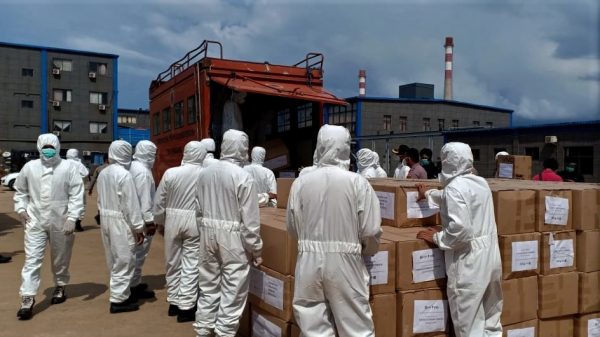But rather than forging a global response to the pandemic, the two superpowers have resorted to blaming one another in an information war.
While Southeast Asian countries express gratitude to both superpowers for their assistance in combatting COVID-19, public attitudes reveal deeper frustrations than their political leadership is able to express. Southeast Asia has responded to the COVID-19 propaganda war between Beijing and Washington much like it has responded to South China Sea disputes — with little protest, even less unity and with almost no say over great power competition.
This division is largely due to differing perceptions of the threats and benefits posed by China. ASEAN states also differ in their capacities and willingness to resist China’s expanding influence. Despite the urgent need for unity and consensus, particularly with regard to rising tensions in the South China Sea, ASEAN responds to crises — from COVID-19 to maritime disputes — with lacklustre disarray.
After initially covering up the pandemic’s severity and spread within China, Beijing changed its tune to encourage a message of stability and responsiveness by February. By March Chinese officials were expressing solidarity with members of ASEAN (from whom they received initial pandemic assistance) through the provision of medical assistance. Around this time, China’s foreign ministry began disseminating a counter-narrative that the US military had brought COVID-19 to Wuhan. The Trump administration responded through US Secretary of State Mike Pompeo, who railed against the ‘Wuhan virus’ at the G7 meeting.
Despite China’s eventual success in containing the spread of the virus domestically, Beijing’s efforts to promote its response as a model for the world fell flat in many quarters of Southeast Asia. Southeast Asian responses to China’s handling of the crisis have been mixed. Despite a lack of democratic governance, most regional states cannot replicate Beijing’s use of authoritarian power to shut down entire provinces and monitor citizens’ movements due to limited government capacity.
China’s pandemic assistance has also been staggered, implying conditionality. Beijing swiftly provided aid to Cambodia and the Philippines, two countries with rulers who are overtly loyal to China. US partners such as Singapore and Vietnam didn’t receive protective equipment until May.
Like their European counterparts, Southeast Asian states have lamented China’s flawed PPE, with common reports of defective masks and testing kits. These reactions have deepened racial animosity towards China according to Nicole Curato. In the Philippines such resentment is linked to frustration over the perception that Chinese citizens are taking Filipino jobs. Indonesia has seen similar discrimination against Chinese communities.
Despite its best efforts to obscure the origins of the virus, Beijing has failed to deflect blame for the pandemic’s outbreak. Yet as Sebastian Strangio recently argued ‘Southeast Asian governments undoubtedly want answers about the origins of the virus and China’s bungled early response, but they have resisted being conscripted into a US-led fight with Beijing’.
Only Malaysia and Indonesia supported the Australian-led inquiry into the origins of COVID-19, drawing the ire of the Chinese Communist Party (CCP). Singapore and Vietnam, both of which closed their borders to travel from China early on in the pandemic, received stern warnings from Beijing. Meanwhile, the CCP lavished praise on Cambodia’s President Hun Sen for his steadfast refusal to stop travel with neighbouring China.
China’s opportunistic manoeuvrings in the South China Sea amid the virus have eroded the goodwill it earned from pandemic assistance to frontline states in Southeast Asia. ASEAN leaders have decried recent maritime provocations with thinly-veiled references to Beijing. Philippines President Rodrigo Duterte, who has pursued entente with China and downplayed the Permanent Court of Arbitration’s decision in Manila’s favour regarding maritime features in disputed waters, voiced concerns about ‘alarming incidents in the South China Sea’ even as ASEAN states struggled to contain COVID-19.
Despite China’s initial missteps and bullying of its smaller neighbours, the United States has been unable to offer an appealing alternative during the crisis. The Trump administration’s inability to contain the pandemic at home has not gone unnoticed around the globe, and though Washington has provided significant aid to Southeast Asian states to fight the virus, its messaging has not clearly resonated. Illustrating the disconnect between resources and pandemic preparedness, Vietnam sent a large shipment of masks to the far wealthier but comparatively hapless United States.
Rather than openly criticise Chinese or US responses to the pandemic, Dan Slater argues that Southeast Asia has largely dealt with COVID-19 with ‘grim resilience’. While some regional governments have used the crisis to seize emergency powers and clamp down on political dissent, most have not concerned themselves with the broader information competition between the United States and China, but rather looked inwards as they have in past crises.
As US–China competition escalates from the pandemic to the South China Sea, ASEAN states find themselves with little influence over the great powers yet again.
Hunter Marston is a PhD candidate in International Relations at the Coral Bell School of Asia Pacific Affairs, The Australian National University.

